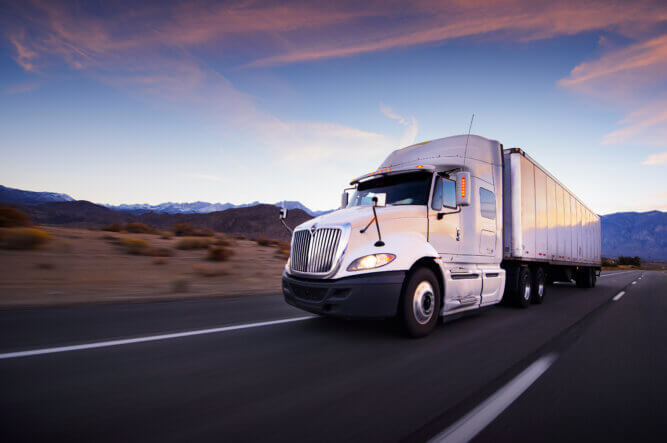18 Truck Driver Tax Deductions You Need to Know

What are you waiting for?
Get our powerful TMS for brokers and carriers alike.
When you’re out on the road, keeping track of all your expenses—like fuel, food, and truck maintenance—in an organized way throughout the year can make tax season more manageable.
But what business expense documentation (like receipts) do you need to keep? And which tax deductions can you claim? Which standard deductions can you apply, and which drivers are eligible?
To help you set up good recordkeeping habits that will pay off at tax time, we’ve outlined common job-related expenses that can be truck driver tax deductions. We’ll also cover some non-business tax credits that can help you save even more money.
Remember, everyone’s situation is different, so you should always get individual advice from your tax professional. This article is for general purposes only and is not a comprehensive guide on tax deductions. Refer to IRS regulations and consult a tax professional for official tax guidelines.
What Are Truck Driver Tax Deductions?
Truck driver tax deductions are tax offsets for business-related expenses. Claiming deductions reduces your taxable income. Federal tax rates are based on income ranges, so lowering your salary with deductions could also lower your tax rate.
Tax deductions vs. tax credits
While tax deductions can lower your taxable income, tax credits reduce the tax you owe. Currently, there are no business-related tax credits for self-employed owner-operators.
Who Can Claim Truck Driver Tax Deductions?
Changes in the tax code have limited the eligibility for claiming truck driver expenses when filing taxes. Only self-employed individuals, such as owner-operators or independent contractors, can qualify for these deductions. Company drivers are not eligible to claim these expenses.
You can tell whether you qualify by looking at what type of tax documents you get at the end of the year. If you get a W-2, you’re a company driver and do not qualify. You can claim all available truck driver tax deductions if you get one or more 1099s as an owner-operator.
18 Truck Driver Tax Deductions That Will Save You Money
Here is a breakdown of common deductible business expenses you can claim on your taxes as an owner-operator. Remember, you must provide receipts or other documentation to claim tax deductions.
Insurance premiums
You can deduct the cost of business-related insurance premiums as a business expense. This could include commercial liability, property damage insurance, and even business interruption or loss of cargo insurance.
If you cover the cost of your own health insurance, you can still deduct it from your taxes, but it’s not considered a business expense. Instead, there’s a designated section on your tax return to claim deductions for health insurance payments.
Association dues
Your membership fees or dues are tax-deductible if you belong to a union or other trucking association. Just remember that to qualify, the group must be directly related to truck driving or the trucking industry.
Cell phone plans
If you have a separate cell line that you use just for your trucking business, you can deduct the entire cost of the plan. However, if you use it for personal and business reasons, you’ll need to figure out what percentage of the time you use it for each purpose and deduct the work-related portion.
Personal electronic devices
Like your cell phone plan, you can deduct the full cost of any phone, laptop, tablet, or other electronic device you use only for work. If you use it for both business and personal reasons, you can deduct the portion that is related to work.
Education
You can deduct expenses for truck driver school or other training to maintain your CDL license if you paid out-of-pocket. Other education may be tax deductible too, as long as it’s directly related to your business or trucking career. As a self-employed owner-operator, this might include business courses to help you learn to better manage your small business and business expenses.
Meal expenses
You can only deduct meal expenses if you’re away from home long enough to need a break for sleep or rest. Carriers that travel regionally or long-haul likely qualify, while those that drive locally probably don’t. Drivers who are subject to “hours of service” regulations can claim 80% of meal expenses purchased on the road.
You have two options when it comes to meal expense deductions. You can either keep all your meal receipts and claim your actual meal expenses, including tax and tip, or you can use the per diem allowance. Per diem is the daily non-taxable reimbursement permitted by the federal government to cover meals and incidental travel expenses. It is calculated in centers per mile. The IRS uses the official General Services Administration (GSA) per diem rates.
Be sure to look up the rates by following the relevant IRS rules.
Medical expenses
As a condition of employment, drivers may be required to get regular medical exams. You can deduct any out-of-pocket costs for these required exams.
However, any medical exams or treatments that are not directly work-related are only deductible as personal expenses. You can only claim them if you itemize deductions rather than taking the standard deduction.
Business clothing
Any specialized clothing or safety gear required for your job, like a company logo shirt, a back brace, steel-toed boots, or safety goggles, can be tax-deductible. Regular everyday clothing does not qualify, even if you wear it while driving.
Dispatch fees
If you pay dispatch fees for your loads, you can claim them as a business expense. Just make sure to track them and keep all invoices or receipts throughout the year.
Licensing fees
You can deduct the cost of state or local government required business licenses. You can also deduct the cost of your CDL license and any other licenses required to conduct your business.
Load expenses
These expenses include any specialized items you buy to help safely carry your loads. Examples include chains, locks, straps, and even wide-load flags.
Tools and equipment
A tool kit is necessary to do your job safely and effectively and is considered an approved tax deduction. Hammers, wrenches, pliers, tire irons, chains, and even electrical tape are all tax deductible.
Fuel and travel expenses
Separate from your annual taxes, you’re required to file quarterly International Fuel Tax Agreement (IFTA) reports. Fuel taxes you pay and the rest of your fuel costs from the road are deductible at tax time. If you use a TMS such as Truckstop’s ITS Dispatch to help with your IFTA reporting, you’ll already have all your fuel tax information at your fingertips when it’s time to file your income taxes.
You can also claim related travel expenses, such as tolls, hotel costs, and parking fees, as long as you incur them on the job.
Office expenses
As a self-employed owner-operator, you likely incur some traditional office expenses while running your business. These include things like postage, photocopying, faxes, accounting software, load board software, calculators, and even pens, and are deductible at tax time.
Subscriptions
Do you subscribe to any magazines or websites focused on the trucking business or industry-related information? If so, you can deduct the full cost of those subscriptions.
Occupational and excise taxes
If you pay these taxes throughout the year, you can deduct them at tax time. Remember to keep records showing what you paid.
Truck repairs and maintenance
Since your truck is considered a qualified, non-personal-use vehicle, you can deduct 100% of all vehicle expenses for truck repair and maintenance. This includes tires or getting your vehicle washed. Additional vehicle expenses include depreciation and loan interest if you financed the purchase. While some industries offer a standard mileage deduction, in the trucking industry, you must deduct your actual vehicle expenses.
Sleeper berth expenses
You can claim expenses associated with setting up your sleeper berth since they are considered necessary for working on the road. Items in this category include a mini-fridge, coffee maker, curtains, bedding, food storage containers, and even first aid supplies.
Non-Trucking Tax Credits
Although these are not specific to the trucking business, you may also qualify for additional tax credits. In some cases, these are refundable. If the credit is bigger than the total tax you owe, you’ll get the difference back as a tax refund.
Examples include, but are not limited to:
- Child and dependent care credit. This is for those who pay childcare expenses for someone under age 13, or who are responsible for someone of any age who is unable to care for themselves.
- Earned income tax credit. This credit is designed to offset the cost of Social Security taxes. It’s available to adults whose income falls below a certain threshold (based on filing status).
- Educational credits. If you’re taking classes, you might qualify for one or both of the tax credits offered to students.
Note that each tax credit has different eligibility requirements, including income level. Things change yearly, so if you meet the basic eligibility criteria (such as being a parent for the child and dependent care credit), it makes sense to apply even if you’re not sure you qualify.
Non-Deductible Truck Driver Expenses
You can deduct most business expenses associated with your job, but not everything. In particular, these items are not deductible business expenses:
- Reimbursed expenses. If someone else, such as the carrier you’re contracted with, pays you back for your expenses, you can’t then claim them on your taxes.
- Home or personal cell phone. You can’t deduct the costs of a landline at home or a personal cell phone not used for business purposes.
- Commuting expenses. You can’t count mileage for your drives between home and the location where you regularly start or end your trips.
- Local route meals. You can’t deduct your daily meals when you’re driving local routes in your home area.
- Everyday clothing. Even if you wear it exclusively when driving your truck, everyday clothing such as jeans and T-shirts cannot be deducted.
- Personal trips. You can’t deduct any expenses for a personal trip, even if you’re using your business vehicle. You must be actively working for tax deductions to apply.
Use a TMS to Simplify Tax Reporting
Filing self-employment taxes is complicated. Unless you happen to be a tax pro, it’s best to use either a tax professional or a high-quality online solution that will take you step-by-step through your filing. But you’ll still need to be diligent about expense tracking, know your numbers, and report everything accurately.
A transportation management system (TMS), like Truckstop ITS Dispatch, simplifies and streamlines your logistics throughout the year. At tax time, you’ll have access to the detailed records and reports you need to file your taxes accurately and claim deductions for your trucking business. See for yourself in our self-guided tour.
Topics:

Find out how our platform gives you the visibility you need to get more done.
Get helpful content delivered to your inbox.
Schedule a demo.
Find out how our platform gives you the visibility you need to get more done.





